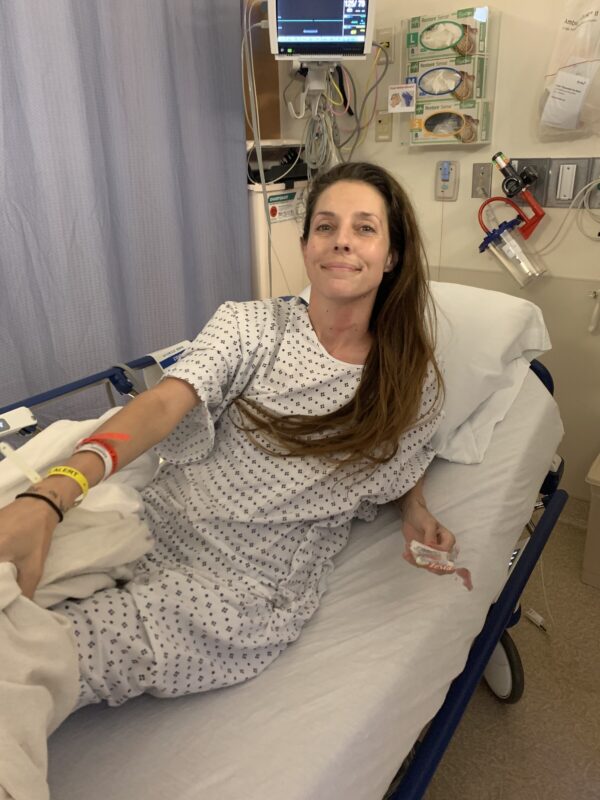My dreams and nursing home plans don’t include liver disease
Retiring to take pottery classes sounds better than watching and waiting
Written by |
“How am I going to get old like this?”
I was watching the film “Thelma” with my husband last night, and five minutes into the opener, I found myself crying.
I’m not a collector of antique things, but I am a longtime appreciator of vintage personalities. I love anything and everything that shows anyone over the age of 70 defying standards, fighting ageism, or even just being their true selves.
I love a good documentary on Iris Apfel or Dr. Ruth, but my partner often tires of my octogenarian obsession. That changes when I put the movie on. As I start to cry for my own selfish reasons, he starts to smile — instantly falling into the film’s beautiful rhythm.
“I don’t think I’ll ever be retired,” he said when it got to the scene where an older gentleman is discussing the amazing classes he takes at his nursing home.
“I want to do that!” I said. “I want to be in theater projects and work out in the pool.”
My husband reiterated the “I don’t think I’ll ever be retired” remark.

A smile before the liver biopsy. (Photo by Bailey Anne Vincent)
“Well,” I said defensively, “I didn’t say I’d be ‘retired.’ I’d probably still be writing or something, but that isn’t being retired. That is still being productive, and learning, and creating.”
“It’s not the same,” he said, thinking in the way a brain thinks when their body doesn’t hurt every single second of the day. “I can’t see myself being happy in a setting like that. I like my alone time.”
Oddly enough, shortly before this tense exchange (for me, not him), I’d been thinking about how unlikely it’d be that I’d ever be like this older gentleman in “Thelma” who takes classes, stars in plays, and is an active member of his in-house community. I can’t even do that now, at 38.
Every single day that I “give” something (for example, driving to a medical appointment), I have a bare minimum of 24 hours “taken,” whether because I’m throwing up from pain or because all the muscles in my spine have seized up from sitting at a right angle in the car for too long, or because I pulled the wrong length of straw when it came to biliary attacks or bile explosions that morning.
I pressed play on “Thelma” on the wrong day, to be fair. That morning, I’d received information that I didn’t know how to process.
What to expect with a likely prognosis
I found out that my cystic fibrosis liver disease (CFLD) was likely never going to get any better than what it was. There were no more medicinal or curative options at this point; I’d just watch and wait for it to worsen. That doesn’t mean it will worsen, but given how my labs have looked for a long time and the confirmation of CFLD through my biopsy, it certainly isn’t the proactive action I was aiming for.
“This is like your CF clinic,” the hepatologist had tried to explain to me at the appointment earlier that day, amid my asking “But can’t you do anything?” on repeat. “You know how you go to CF clinic every few months, and they keep track of things? That is what we will do here, too.”
“I was hoping they’d say they could do some sort of surgery to remove something,” I said to my husband when I get home that night, “or like, some new trial I didn’t know about. Not just watch me indefinitely.”
“Isn’t it wild that doctors are paid to basically be spectators?” my husband said after I told him my news, and he didn’t mean it as a dig; he actually loves this doctor a lot. But it’s an astute point when it comes to the positions some of us with chronic illness find ourselves in.

Lazy smile, lazy liver. (Courtesy of Bailey Anne Vincent)
“What can your doctor do?” the world (normally from the mouths of well-meaning family and friends) asks us patients, exactly as I asked my hepatologist, longing for something cut and dry, even if it involves cutting into me. I’d always prefer action before everything feels like a reaction, but that’s rarely the healthiest way for medicine to treat those who can’t be cohesively treated.
Even worse, once well-meaning family and friends ask the patient “What can the doctor do?” enough times, the honest answer simply becomes “Wait. And watch for when it gets worse.” And no one wants to hear that.
“I just realized today that after the last year of frantically trying to do as much as possible to improve my health,” I say to my partner, as the long liver day draws to an end, that “this might be as good as it gets right now. This decline. This worsening might actually be my new best.”
I’ve no doubt that more surgeries lie ahead and that medical breakthroughs could be invented to help, but right now, I just want to become an 80-year-old who takes pottery classes in a small community.
I found myself crying because “Thelma” is a beautiful movie about not underestimating anyone, no matter their age. But part of me just wanted to grow to the age where I can be underestimated.
Note: Cystic Fibrosis News Today is strictly a news and information website about the disease. It does not provide medical advice, diagnosis, or treatment. This content is not intended to be a substitute for professional medical advice, diagnosis, or treatment. Always seek the advice of your physician or other qualified health provider with any questions you may have regarding a medical condition. Never disregard professional medical advice or delay in seeking it because of something you have read on this website. The opinions expressed in this column are not those of Cystic Fibrosis News Today or its parent company, Bionews, and are intended to spark discussion about issues pertaining to cystic fibrosis.







Shannon Johnston
Is a liver transplant a possible option? I know it is a last resort to be sure. But I had a lung transplant at age 40 and I am a lot closer to retirement and nursing home pottery than I ever would have been without it 6 years ago. Also life is much easier for me now. Hopefully it is an option for you when the time comes. 🍀